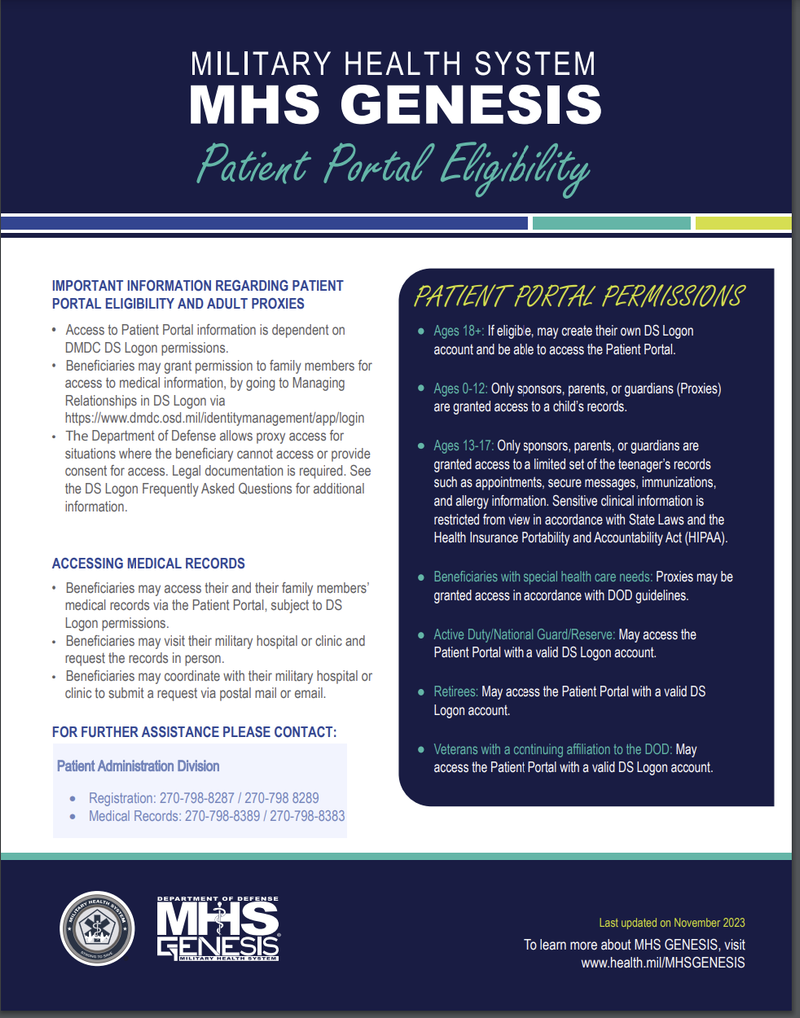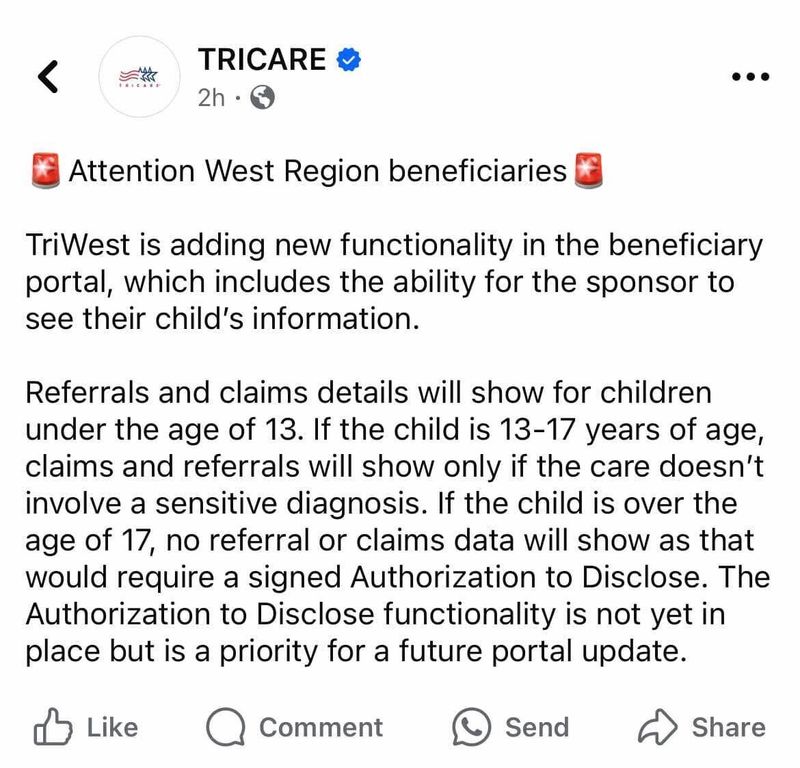HIPAA RULE LIMITS MILITARY PARENTS' ACCESS TO TEEN RECORDS
COMMENT
SHARE

ADVERTISEMENT
Healthcare continues to get more complex and it’s a lot for anyone to keep up with. For military families? It’s even more complicated having to navigate TRICARE, the VA, etc. However, particularly for families with minors, understanding the HIPAA Privacy Rule is essential. Here’s everything you need to know.
HIPAA Privacy Rule: Key Provisions for Military Families
The HIPAA Privacy Rule is a federal law in the United States providing everyone with privacy regarding their medical records and other related healthcare information.
This means that without authorization, an individual receives limits and conditions on how their information is used and who has access to it.
Nobody Prepared You for Military Life
But we can help. Join over 100k spouses already getting the advice, resources, and military tea they need to thrive.
HIPAA Application for Military Parents of Minors
Yes, the Health Insurance Portability and Accountability Act Privacy Final Rule does apply to minors, providing them with privacy surrounding their healthcare.
Not only does this allow children more control over their healthcare choices and treatment options but it also limits access from all parties involving their protected health information (PHI).
How HIPAA applies depends on a few factors, including the age of the minor. HIPAA’s Privacy Rule means parents and legal guardians will have limitations in accessing their child’s healthcare information without authorization.
Military families are subject to these laws, as the Defense Health Agency (DHA) follows the legislation in the United States. Under the rule, people qualify as minors who meet the following criteria:
- They are being cared for, under the custody of, and have the support of their parents or legal sponsor before turning 18.
- Students under 21 years old are also minors if they are still under the care, custody, or support of their parents or legal sponsor.
- Those under 18 years old are minors if they aren’t or haven’t been married yet.
- Minors are not service members in the U.S. Uniformed Services.
- Furthermore, individuals under the age of 18 years old and not living away from their parents or legal sponsor or able to support themselves, are also minors.
Keep in mind these eligibility factors apply stateside.
For families overseas, minors can request reproductive health services, even via telehealth from providers at a military hospital or clinic, and if they are deemed mature enough, care can be provided without the consent of a parent or legal guardian.
U.S. HIPAA Laws: Impact on Military Minors
While Americans can access their healthcare records electronically and through print, there are still limits on what parents can access when it comes to the PHI of their children.
Using the MHS GENESIS portal, families can view their electronic health records (EHRs) through secure patient portals used for a variety of healthcare tasks.
However, because of HIPAA, access to EHRs varies by age. Here’s a breakdown of how it all works:
- Parents and legal sponsors have access to EHRs and all online PHI for minors under the age of 13.
- However, parents and legal sponsors can only access the online patient portal to view appointments, care related to allergies, messaging, and immunizations, for minors between the ages of 13 and 17.
If you’re looking to access the paper health records of a minor, you have to access them under certain circumstances, going through the hospital or clinic’s medical records department.
Both paper and electronic records for minors are available only when the child didn’t give their own consent for the visit or provided consent for care and gave permission in writing. Keep in mind this only allows the parent access to PHI for that visit.

Additional MHS GENESIS Portal Access Information
- Proxies can access information for beneficiaries with special healthcare needs, so long as DoD guidelines are met.
- Active Duty/National Guard/Reserve service members can use a valid DS Logon account to reach the patient portal.
- Retired Veterans and Vets who maintain a DoD affiliation with a valid DS Logon account can access the patient portal.
The permissions within each patient portal will depend on those allowed through the DMDC DS Logon permissions:
- If you’re a beneficiary, go to the Managing Relationships in the DS Logon to allow permissions for family members.
- Proxies with legal documentation proving their eligibility may also be allowed to access information.
If you need help accessing healthcare records or need to register for the portal, you can do so by reaching out to the numbers below:
- Registration: 270-798-8287 or 270-798 8289
- Medical Records: 270-798-8389 or 270-798-8383
ADVERTISEMENT
State Laws
Under the HIPAA Privacy Law, minors can provide informed consent for certain types of care, such as mental health, pregnancy, and sexual health.
However, the rules of which care is available for minors to consent to vary depending on the location.
All 50 states, U.S. territories, and the District of Columbia operate differently, and the DHA follows each no matter the circumstances.
Therefore, it’s critical that parents know and understand the state laws that apply to their families in regard to their healthcare.
Overseas HIPAA Laws Affecting Military Families
When it comes to the HIPAA Privacy Rule and children overseas, things operate differently—specifically when it comes to reproductive healthcare.
The Minors and Reproductive Health Care Services (Overseas) Memorandum is the authority here as state and federal law isn’t mandated outside of the United States.
Using the Memorandum, the determination is made on whether or not a minor is mature enough to make their own reproductive healthcare decisions.
This includes a range of services, including preventing pregnancy with prescriptions, treatment, examinations, etc.
While minors differ depending on the country, under these definitions, minors are ages 18 and under while mature minors are ages 15 and older.
Having access to the PHI of a minor depends on their informed consent; however, parents or legal sponsors may be notified if there is a life-threatening condition, a condition that requires the removal of reproductive organs, or if behavior changes may cause harm to the minor or others.

Military Families React to HIPAA Restrictions on Medical Records Access
With the changes involving TriWest affecting healthcare for military spouses, it’s important to note that the beneficiary portal will now let sponsors view their child’s information:
- HIPAA allows referrals and claims details to be visible for children under 13.
- Minors between the ages of 13 and 17 will have their information shown unless it involves a sensitive diagnosis.
- Children 18 and older will not display information without a signed Authorization to Disclose. This will be added in the future through an update to the system.
Some families disagree with the lack of access; however, studies have shown the benefits of confidentiality for minors.
Particularly, because it allows them to speak freely on sensitive topics involving their sexual health, substance abuse, mental health, and more.
Otherwise, many minors forgo seeking treatment altogether. The HIPAA Privacy Rule is the federal standard, allowing military families greater control over their information.
Suggested reads:
Join the Conversation
BY BUDDY BLOUIN
BY BUDDY BLOUIN
Buddy Blouin is a Contributing Writer at VeteranLife.com
ADVERTISEMENT
ADVERTISEMENT




